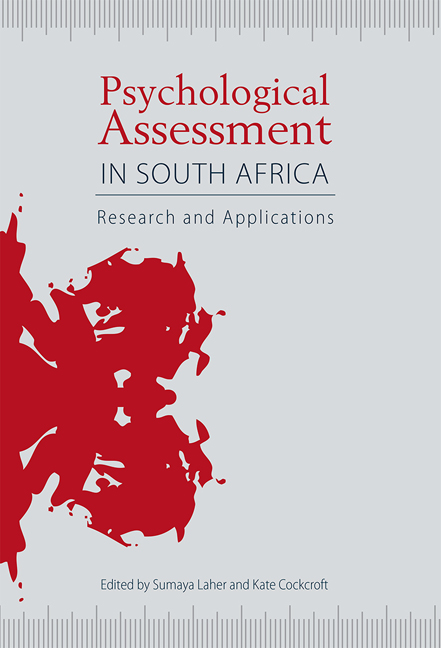Book contents
- Frontmatter
- Contents
- Tables and figures
- Acknowledgements
- Acronyms and abbreviations
- 1 Contextualising psychological assessment in South Africa
- Section One Cognitive tests: conceptual and practical applications
- 2 WAIS-III test performance in the South African context: extension of a prior cross-cultural normative database
- 3 WISC-IV test performance in the South African context: a collation of cross-cultural norms
- 4 The Senior South African Individual Scales – Revised: a review
- 5 Assessing school readiness using the Junior South African Individual Scales: a pathway to resilience
- 6 School readiness assessment in South Africa
- 7 The Kaufman Assessment Battery in South Africa
- 8 The Das-Naglieri Cognitive Assessment System
- 9 Dynamic assessment in South Africa
- 10 The Learning Potential Computerised Adaptive Test in South Africa
- 11 APIL and TRAM learning potential assessment instruments
- 12 The Griffiths Mental Development Scales: an overview and a consideration of their relevance for South Africa
- 13 Neuropsychological assessment in South Africa
- Section Two Personality and projective tests: conceptual and practical applications
- Section Three Assessment approaches and methodologies
- Contributors
- Index
2 - WAIS-III test performance in the South African context: extension of a prior cross-cultural normative database
from Section One - Cognitive tests: conceptual and practical applications
Published online by Cambridge University Press: 21 April 2018
- Frontmatter
- Contents
- Tables and figures
- Acknowledgements
- Acronyms and abbreviations
- 1 Contextualising psychological assessment in South Africa
- Section One Cognitive tests: conceptual and practical applications
- 2 WAIS-III test performance in the South African context: extension of a prior cross-cultural normative database
- 3 WISC-IV test performance in the South African context: a collation of cross-cultural norms
- 4 The Senior South African Individual Scales – Revised: a review
- 5 Assessing school readiness using the Junior South African Individual Scales: a pathway to resilience
- 6 School readiness assessment in South Africa
- 7 The Kaufman Assessment Battery in South Africa
- 8 The Das-Naglieri Cognitive Assessment System
- 9 Dynamic assessment in South Africa
- 10 The Learning Potential Computerised Adaptive Test in South Africa
- 11 APIL and TRAM learning potential assessment instruments
- 12 The Griffiths Mental Development Scales: an overview and a consideration of their relevance for South Africa
- 13 Neuropsychological assessment in South Africa
- Section Two Personality and projective tests: conceptual and practical applications
- Section Three Assessment approaches and methodologies
- Contributors
- Index
Summary
The focus of this chapter is on the Wechsler Adult Intelligence Scale – Third Edition (WAIS-III) and its application within the South African context. While there is now a fourth edition of the Wechsler Adult Intelligence Scale, WAIS-IV (Wechsler, 2008), the only cross-cultural research within the South African context to date is in respect of the WAIS-III, the normative implications of which continue to have crucial relevance for practitioners wishing to employ a WAIS in this country.
Importantly, two distinct categories of norms have been delineated in the psychometric assessment literature: (i) population-based norms (standardisation data) representative of the general population that are typically derived on large samples and presented in association with a newly developed test; and (ii) norms that closely approximate the subgroup to which an individual belongs (withingroup norms), such as form the basis of the leading normative guidebooks in clinical neuropsychology (Mitrushina, Boone, Razani & D'Elia, 2005; Strauss, Sherman & Spreen, 2006).
The objective of standardisation data is to allow for the location of an individual's ability relative to the general population, for purposes such as institutional placement. In contrast, the purpose of within-group norms is to allow for comparisons of an individual's level of performance with the subgroup that best approximates his or her unique demographic characteristics for diagnostic purposes, and is the impetus behind the data for presentation in this chapter.
Within-group norms with fine levels of stratification are regularly reported descriptively in terms of means and standard deviations, and may be based on small sample numbers (for example, n < 10, and in some instances the sample numbers may be as low as n = 1 or 2). Nevertheless, such normative indicators are considered less prone to the false diagnostic conclusions that may accrue via comparisons with population-based standardisation data that are not demographically applicable in a particular case (Lezak, Howieson & Loring, 2004; Mitrushina et al., 2005; Strauss et al., 2006).
The history of the Wechsler Adult Intelligence Scales
Historically, the various WAIS in current usage have their origins in the release of the Wechsler-Bellevue Intelligence Scale Forms I and II in 1939 and 1944, respectively (Wechsler, 1939; 1944). Over the years, the adult Wechsler tests in their various refined and updated versions, currently covering the age range from 16 to 89 years, have accumulated a wealth of endorsement through clinical and research experience.
- Type
- Chapter
- Information
- Psychological Assessment in South AfricaResearch and Applications, pp. 17 - 32Publisher: Wits University PressPrint publication year: 2013



